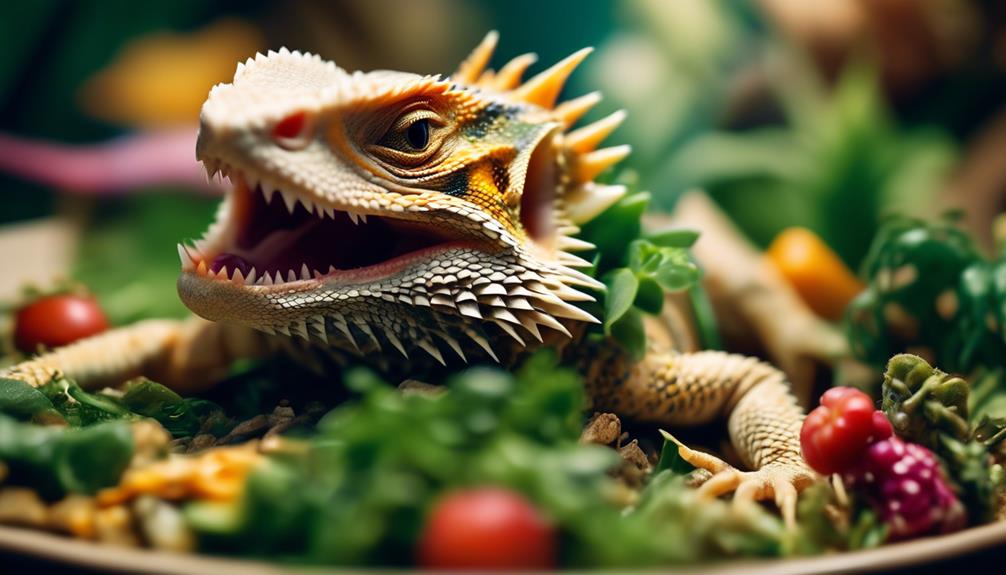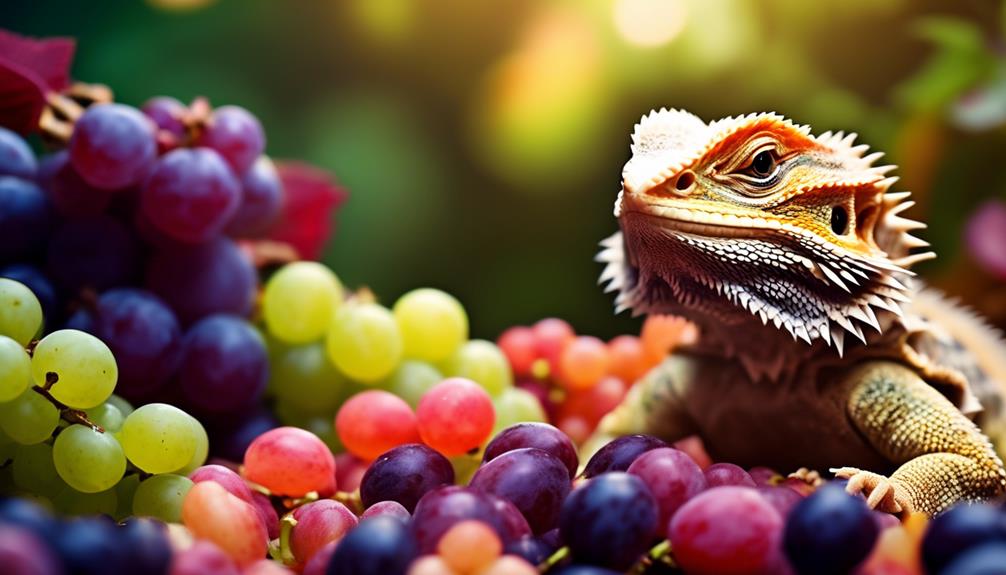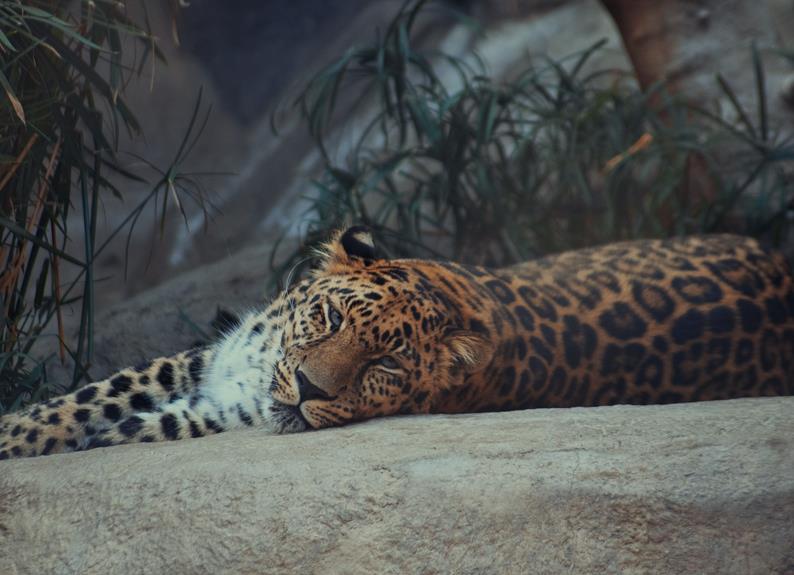Did you know that geckos are omnivores? That means they can eat both plants and animals! Geckos are found all over the world, from tropical regions to desert climates. Providing these amazing lizards with a balanced diet is essential for their health and wellbeing. In this article, we’ll explore what geckos eat and how to ensure your gecko is getting all the nutrition it needs. We’ll discuss insects, fruits and vegetables, calcium and vitamins, as well as how to feed your gecko properly. Let’s take a closer look at this important topic so you can provide your pet with the best food possible.
Key Takeaways
- Geckos should be fed small pieces of food that are easy to chew and digest.
- Portion control is important to prevent obesity in geckos.
- Geckos require a balanced diet that meets their nutritional needs.
- Meal planning should consider the size and nutritional requirements of the gecko, and include a variety of food items.
Overview of Gecko Nutrition
You may be surprised to learn that geckos have a pretty varied diet! Gecko nutrition is based on the species and their environment. In captivity, geckos generally need supplemental foods in addition to live prey. These supplemental foods can range from commercial diets made specifically for geckos, to home-made food items. The optimal diet for geckos should include a combination of these two types of food sources. A balanced diet should consist of proteins, carbohydrates, fats, vitamins and minerals which can be found in both commercial diets and live prey. Commercial diets should be supplemented with other small insects such as crickets or mealworms as an additional source of protein and calcium. Live prey also provide essential nutrients that are not found in prepared foods alone. This includes beneficial bacteria that aid digestion plus natural enzymes and fats which help maintain the health of your pet’s digestive system. Understanding the dietary needs of your particular species is important when creating a nutritious mix for your gecko’s daily meals. Keeping this in mind will ensure you are providing them with all the necessary nutrients they need to stay healthy and happy! As we move into discussing what kinds of insects make up a good part of a gecko’s diet, it’s important to remember that variety is key when it comes to feeding your pet lizard.
Insects as a Gecko Diet
Insects are a great source of protein for geckos and should make up the bulk of their diet. There is a wide variety of insects available to feed your gecko, including crickets, waxworms, mealworms, silkworms, roaches and more. To ensure that your gecko is getting all the essential vitamins and minerals they need from these insects be sure to gut load them prior to feeding.
Sources of Protein
Geckos get a lot of their protein from insects, but they can also get it from other sources like eggs and small mammals. Live food such as:
- Mealworms
- Crickets
- Wax worms
Provide essential proteins for geckos. Eggs are a great source of protein and nutrients that can be found in the wild or purchased at pet stores. Small mammals like mice, hamsters, and gerbils are another option for protein depending on the size of your gecko. Variety is key to ensure your gecko receives all the necessary vitamins and minerals needed for a healthy diet. Offering a variety of insects will help provide the nutrition needed for your reptilian friend to thrive!
Variety of Insects
To ensure your gecko receives all the nutrition it needs, you should offer a variety of insects like mealworms, crickets, and wax worms. Careful handling is essential when feeding live insects to your pet; if you’re not sure how to safely handle them or what size enclosure they need, consult with an experienced reptile caretaker.
| Insects | Nutritional Benefits | Safety Tips |
|---|---|---|
| Mealworms | High in protein & calcium | Handle with gloves & tongs |
| Crickets | Rich in vitamins A & D3 | Avoid overcrowding enclosure |
| Wax Worms | Boost appetite & energy levels | Keep away from other animals |
Gut-loading the insects prior to feeding adds even more nutritional value for your gecko.
Gut Loading
Gut-loading your gecko’s food adds essential nutrition and can give them the energy they need to thrive. Supplementing their diet with gut-loaded insects is a great way to ensure their nutritional needs are met. Gut loading is the practice of feeding the food that will be fed to the gecko an enriched diet prior to being offered as food. This allows for better absorption of vitamins, minerals, and other nutrients which will help promote healthy growth and development in your pet. Not only do you need to provide gut-loaded insects but also make sure there is plenty of water available for drinking as well as humidity levels appropriate for optimal health. By properly gut loading your gecko’s food, you can ensure they have access to all of the necessary nutrients they require, giving them the best chance at living a long and happy life! To further enhance their nutrition, consider adding fruits and vegetables into their diet.
Fruits and Vegetables
Fruits and veggies make up a large portion of a gecko’s diet, providing it with essential vitamins and minerals for optimal health. Geckos have evolved to be skilled foragers, so they need to eat a variety of fruits and vegetables to meet their dietary needs. When considering what fruits and veggies are appropriate for a gecko’s diet, it is important to consider both their eating habits as well as their foraging strategies.
Berries such as blueberries, raspberries, and blackberries are great sources of natural sugars that provide energy for the gecko. Leafy greens such as kale, spinach, collards, mustard greens, parsley and turnip tops are high in calcium which helps maintain healthy bones and teeth. Fruits like apples or bananas should be cut into small pieces so the geckos can easily consume them without choking or becoming overwhelmed by the size. Vegetables like carrots or squash can also be given in small pieces; however it is best to avoid starchy vegetables such as potatoes or corn since these may cause digestive problems in some species of geckos.
In addition to fruits and vegetables, occasional treats such as mealworms or wax worms can also be offered but not on a regular basis due to their higher fat content which could lead to obesity if fed too often. Serving up a balanced diet full of diverse fruits and vegetables will keep your pet healthy while also providing enrichment through foraging activities! Moving onward we will discuss how calcium and vitamins play an important role in achieving optimal nutrition for your pet gecko.
Calcium and Vitamins
Most fruits and vegetables are great sources of vitamins and minerals for your gecko. However, there are other key nutrients they need as well to maintain a healthy diet. Calcium and vitamins should be supplemented in addition to their regular meals to make sure your gecko is getting everything it needs. Here are some tips for providing the necessary calcium and vitamins:
- Minerals – Dusting food with powdered calcium supplements is an easy way to give your gecko essential minerals. This can be done once or twice a week depending on the type of food you’re feeding them.
- Supplements – Supplement blocks or liquid drops provide extra vitamins in addition to their normal diet. These can be purchased at most pet stores and can help ensure that all of your gecko’s vitamin needs are met.
- Dusting Foods – You can also dust foods such as crickets or other insects with powdered calcium supplements before feeding them to your gecko. This helps give them the nutrients they need while still being able to enjoy their meal!
- Variety – Variety is key when it comes to making sure your gecko is getting all of its necessary vitamins and minerals. Offer a variety of fruits, vegetables, bugs, and supplements so they get the nutrition they need without having too much of one particular item.
Providing these essential nutrients helps keep your gecko healthy while giving them a balanced diet that will have them feeling their best! Taking care not only means providing food but also making sure that every aspect of their diet is covered with proper supplementation where needed—and that includes calcium and vitamins!
Feeding Your Gecko
Giving your gecko the right kind of food is essential to its health and happiness, so it’s important to know what they need! Geckos are omnivorous animals, meaning they eat both plants and insects. A well-balanced diet should include a variety of proteins, fruits, vegetables, and gut-cleaning insects such as crickets or mealworms. You could plan meals for your gecko by creating a rotational schedule that includes different food types and brands each day. This helps make sure your gecko is getting the right balance of vitamins and minerals in their diet. When preparing these meals for your gecko, you want to avoid large pieces of food as they can be difficult to chew or digest properly. Instead opt for smaller pieces that are easy for them to swallow without having to break down too much. Additionally, try not to overfeed your gecko as this can lead to obesity which can harm their health in the long run. It’s important that you give them enough food so they get all the nutrients needed but also keep an eye out on how much they consume per feeding session. With proper meal planning and preparation, you’ll be able to ensure that your gecko gets all the nutrients it needs for a happy life!
Frequently Asked Questions
How often should I feed my gecko?
It’s a great idea to hand feed your gecko once or twice a week, and make sure to gut-load their food before doing so. Feeding them regularly will help keep them healthy while also providing an opportunity for bonding between you two. Take the time to research what is best for your gecko’s diet and nutrition. Doing this will ensure they receive all the nutrients they need for a long, happy life!
How do I know if my gecko is getting enough nutrition?
To ensure your gecko is getting enough nutrition, pay attention to their diet and consider adding supplements. Look out for signs of calcium deficiency, such as soft bones or twitching muscles. Monitor your gecko’s health and adjust their diet accordingly to keep them healthy and thriving.
What kind of insects are suitable for a gecko diet?
You can feed your gecko crickets and mealworms as part of their diet. Crickets are an excellent source of protein and vitamins, while mealworms provide essential fats and minerals. Both insects will ensure your gecko receives the nutrition it needs to stay healthy.
Are there any foods that geckos should never eat?
Just like a person with food allergies, geckos too can have intolerances to certain foods. To ensure a healthy and varied diet for your gecko, pay attention to any adverse reactions they may have and avoid those foods in the future. Variety is key!
What are some creative ways to feed my gecko?
Try feeding your gecko with creative tools like tongs or tweezers. Meal plan by offering variety in the form of insects, fruits, and vegetables for balanced nutrition. Serve them in small portions to keep them healthy and happy!
Conclusion
You’ve learned that geckos are omnivores, meaning they require a balanced diet of both proteins and plants. Insects should make up the majority of their diet, supplemented with fruits and vegetables for additional nutrients. Calcium and vitamins should also be provided, either through supplements or by gut-loading insects before feeding them to your gecko. For example, you could feed your gecko crickets that have been fed a calcium-rich diet before being served as food for your pet. With proper nutrition, you can ensure your gecko will remain active and happy!


